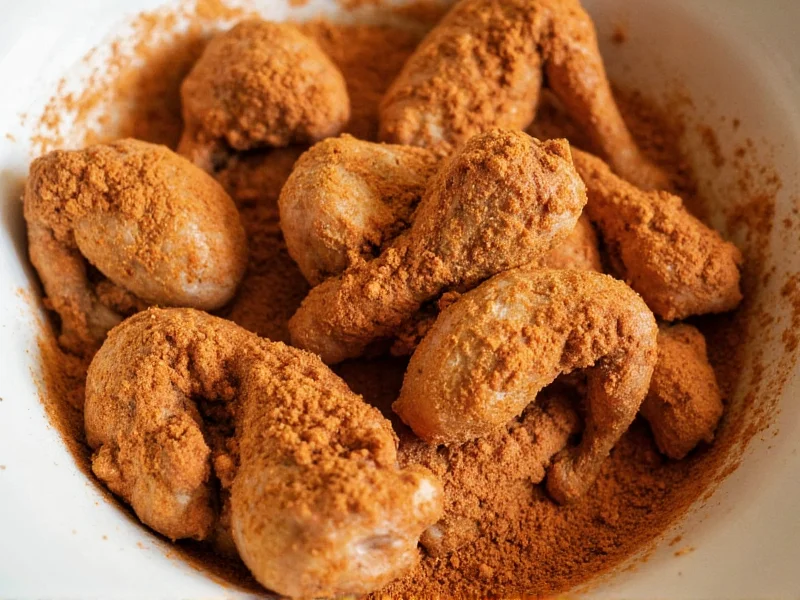Understanding how to properly use five spice powder with chicken transforms ordinary poultry into extraordinary meals. The magic happens when the warm, complex flavors of this traditional Chinese blend interact with chicken's mild protein structure. Unlike single-note spices, five spice powder creates multidimensional flavor profiles that develop beautifully during cooking.
The Science Behind Five Spice and Chicken
Five spice powder's unique composition makes it particularly effective with chicken. The star anise provides licorice-like sweetness that caramelizes during cooking, while cloves add depth and antimicrobial properties that help preserve freshness. Cinnamon contributes warmth without overwhelming heat, Sichuan peppercorns deliver that distinctive tingling sensation (ma la), and fennel seeds offer subtle sweetness that complements poultry's natural flavors.
When applied to chicken, these spices work synergistically. The fat in chicken skin and meat acts as a carrier for the fat-soluble flavor compounds in the spices, allowing deeper flavor penetration than with leaner proteins. This is why five spice powder chicken develops richer taste as it marinates—ideally 4-12 hours for optimal results.
Mastering Five Spice Chicken Techniques
Successful five spice chicken preparation depends on technique selection. Different cooking methods require specific approaches to maximize flavor development while preventing common issues like burnt spices or uneven seasoning.
| Cooking Method | Marinating Time | Temperature Guide | Key Technique |
|---|---|---|---|
| Roasting | 8-12 hours | 375°F (190°C) | Pat skin dry before applying spice rub |
| Grilling | 4-6 hours | Medium heat (350°F/175°C) | Oil grill grates to prevent spice adhesion |
| Stir-frying | 30-60 minutes | High heat (400°F+/200°C+) | Add powder late in cooking to preserve volatile oils |
| Slow cooking | 2+ hours | Low setting (200°F/95°C) | Add half initially, remainder in last hour |
Perfecting Your Five Spice Chicken Recipe
Creating exceptional five spice powder chicken requires attention to detail beyond simply applying the spice blend. The quality of your five spice powder significantly impacts results—freshly ground spices maintain volatile aromatic compounds that deteriorate in pre-mixed commercial blends.
For the best five spice chicken recipe, consider making your own blend: combine 2 tablespoons star anise, 1 tablespoon cloves, 1 tablespoon cinnamon sticks, 2 teaspoons Sichuan peppercorns, and 2 teaspoons fennel seeds. Toast gently in a dry pan until fragrant, then grind to a fine powder. Store in an airtight container away from light.
When preparing five spice chicken stir fry, add the powder during the final minute of cooking to preserve delicate flavor compounds. For roasted five spice chicken, create a paste with oil or yogurt to help the spices adhere and penetrate the meat. The ideal internal temperature for chicken thighs is 175°F (80°C), while breasts should reach 165°F (74°C) for perfect texture.
Troubleshooting Common Five Spice Chicken Issues
Many home cooks encounter challenges with five spice powder chicken marinade absorption. If flavors aren't penetrating sufficiently, try these solutions:
- Score the chicken skin in a crosshatch pattern to create entry points for the marinade
- Use a yogurt or oil-based marinade rather than acidic components which can cook the surface prematurely
- Inject the marinade directly into thicker cuts using a meat injector
- Bring chicken to room temperature before cooking for more even heat distribution
When spices burn during high-heat cooking, reduce the temperature slightly and monitor closely. For five spice chicken flavor profile balance issues, add complementary elements:
- Too sweet? Add rice vinegar or lime juice
- Too spicy? Incorporate honey or brown sugar
- Overpowering? Dilute with additional oil or neutral broth
- Lacking depth? Add a splash of soy sauce or fish sauce
Five Spice Chicken Variations Worth Trying
While traditional preparations remain popular, modern interpretations of five spice powder chicken offer exciting possibilities. For a contemporary twist, try a five spice chicken and mango salad with lime dressing. The tropical fruit complements the warm spices beautifully.
Another excellent variation is five spice chicken soup, where the spice blend infuses the broth with complex aromatics. Add the powder early in the cooking process to allow full flavor extraction, then finish with fresh herbs. For those exploring five spice powder substitution for chicken, consider replacing star anise with anise seed or fennel bulb for similar licorice notes.
When preparing five spice chicken wings recipe, double-cook method yields exceptional results: first bake at 300°F (150°C) until nearly done, then increase heat to 425°F (220°C) for crisping. Toss in a glaze of honey, soy sauce, and additional five spice powder during the final minutes.
Storing and Reheating Five Spice Chicken
Proper storage maintains the delicate flavor balance of five spice chicken. Store leftovers in airtight containers within two hours of cooking. The spices continue to develop in refrigerated conditions, so flavors often improve overnight.
For best reheating results, avoid microwaves which create uneven heating and steam the skin. Instead, reheat in a 325°F (165°C) oven until internal temperature reaches 165°F (74°C), or use a skillet with minimal oil to restore crispness. Adding a splash of chicken broth prevents drying during reheating.











 浙公网安备
33010002000092号
浙公网安备
33010002000092号 浙B2-20120091-4
浙B2-20120091-4